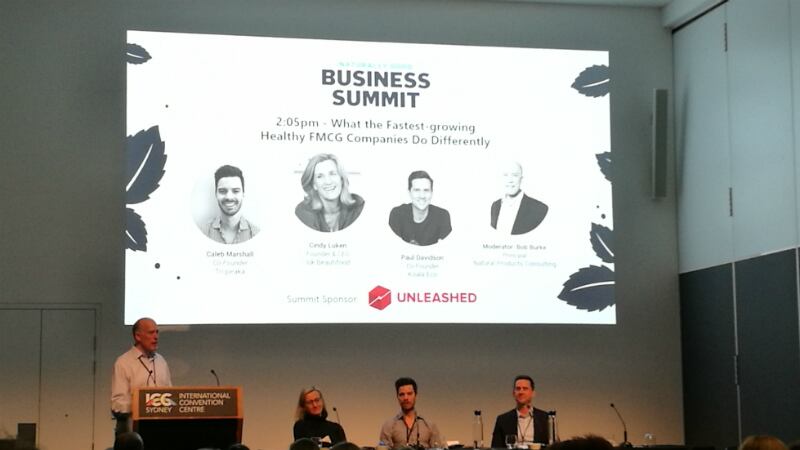Convening at the Naturally Good Expo 2019 Business Summit, the panel comprised of Tropeaka Managing Director Caleb Marshall, luk Beautifood Founder and CEO Cindy Luken and Koala Eco Founder Paul Davidson.
Tropeaka is a health foods and supplements company best known for its popular range of vegan protein powders, whereas luk Beautifood and Koala Eco are well-known nationwide for their 100% natural food-based lipstick range and natural cleaning products range, respectively.
The session was moderated by Natural Products Consulting founder Bob Burke.
Here are the key highlights of the discussion:
Underpriced marketing
Underpriced marketing was cited to be one of the major sources of growth for Tropeaka, with Marshall emphasizing that it paid off to ‘do what is difficult’.
“We buy underpriced marketing: Snapchat ads, Instagram stories, Facebook stories, [things like that],” he said.
“We do things that are difficult to do, [because] it means other people don’t do it. Things like pinterest advertising [aren’t that popular] – I asked about 200 people at an e-commerce expo if anyone was doing it, but not a single hand went up.”
System and software stability
Marshall added that many businesses focused on growth and increasing sales, but failed to look at what comes after that.
“[It is important] to have the systems and processes in place in order to facilitate and process the growth. We had to look at everything from xero-accounting software to inventory management systems to e-commerce platforms and more,” he said.
“Systems are incredibly important – it is better to put systems in place and then grow even if that incurs a financial cost, instead of the other way around.”
Luken advised companies to also consider the option of bringing in proper expertise when trying to raise business scale.
“At luk Beautifood, when we first looked at scaling up, we had already built a [pretty rounded] team with professionals from various fields – and we still hadn’t gotten the expertise right,” she said.
“[The initial strategy we looked at] was online, so we put a lot of money into that, and [lost a lot there] – our cashflow in that first year was horrendous [and] six months later, the business wasn’t scaling].”
Burke concurred, adding that: “Almost anyone can benefit by having an advisory board that can help to identify risks, hold you accountable and provide contacts.”
Brand protection: Thinking long-term
According to the panel, brand protection is one of the most important points that companies need to factor in when making any decision if growth is the objective.
“Brand protection is crucial for any company that is thinking in the long-term – in Tropeaka, we protected the brand in every single decision making process possible, not looking for any short-term wins,” Marshall said.
“Here, this means things like product quality. Tropeaka in the business of making people healthy, so using crappy ingredients might [show quick returns] short-term, but certainly would not look good in the long run.”
“We also tried to stop, as much as possible, [poor-quality] websites selling our product [as this could] reflect badly on the brand [although] this could make us more money in the short term.”
Davidson concurred, adding that it was crucial to ‘not rush’ when thinking about expansion and growth – product quality must be first priority.
“If you’re going to ask someone to pay a premium price, your ingredients must [match up], you must deliver on your promise, and your products must stand out,’ he said.





